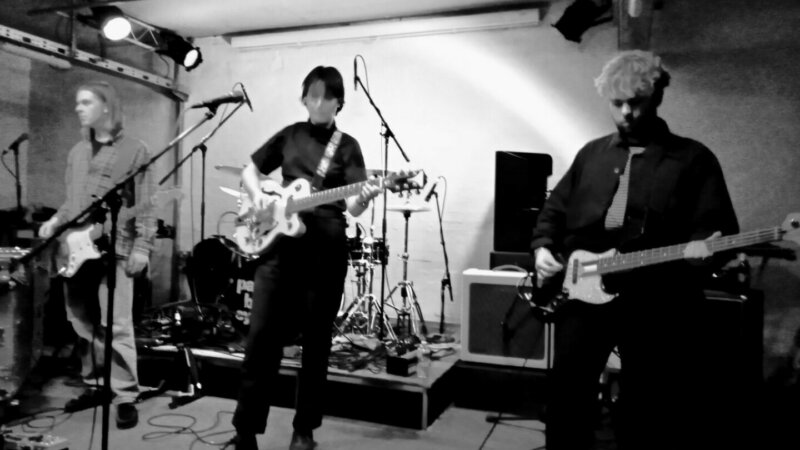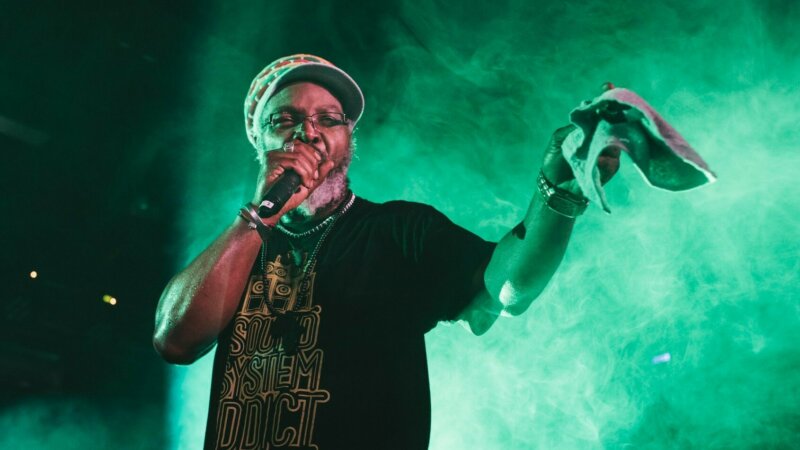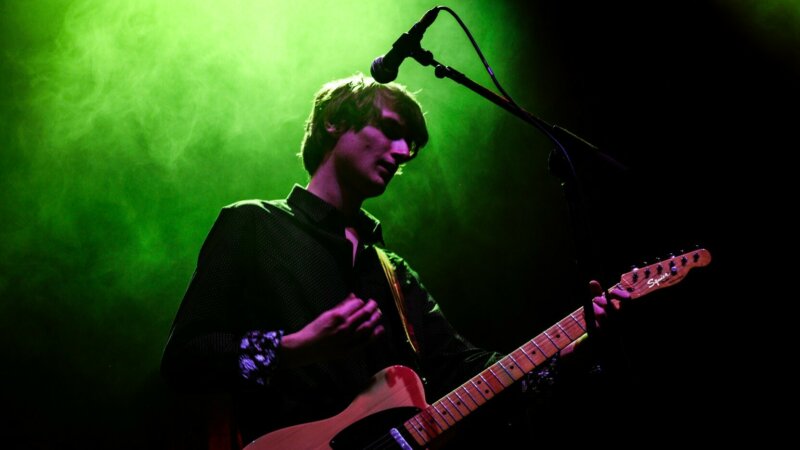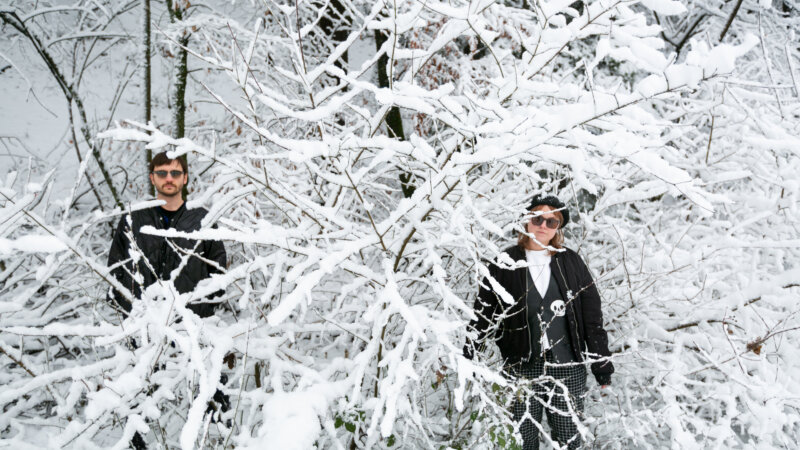Misha Gray’s Prehistoric Jazz Quintet / Pity Like 01
17 AUGUST
LESCAR
Music has existed since well before the beginnings of written history, an imperishable medium of expression. Good music provokes a different reaction in every listener, but always a powerful one. This stunning performance by Misha Gray’s PrehistoricJazz Quintet was a reminder that, in its purest form, music transcends time and culture.
On entering the cosy living room setting of The Lescar’s back room, I proudly flaunted my fresh saxophone hand stamp to what seemed like an established crowd. My showing off was wasted on the regulars, who were understandably more enamoured by Gray, who worked the floor, chatting to current and potential fans.
Misha Gray positioned himself modestly at the side of the performance space, his fellow musicians taking centre stage. In his spare time, Misha is a junior doctor. The room was crammed with mismatched chairs, leaving little space for groove, but other than foot tapping the audience were frozen stiff, fixated on each highly-skilled musician in their flourishing moments.
Returning to The Lescar for another Wednesday evening jazz slot, Misha Gray’s prehistoric tribe created flawless moments of improvisation, sounding both natural and endlessly interesting. The multi-textured ensemble of tropical jazzists was the perfect package for the informal and laid-back atmosphere of the pub, where the musicians could produce simultaneously calming and rousing rhythms.
An incredible, clattering drum solo from Johnny Hunter pulled the crowd into further stasis and they stayed that way for solos from saxophonist Kyran Matthews and trumpeter Nick Walters. The woodwind and brass specialists must have stupendous lung capacities.
The crew demonstrated solid togetherness, listening intently to one another and flowing as a team. A buzz during the interval indicated that the quintet were significantly impressive to stir up jazzy chatter.
Jennifer Martino
|
20 August
Audacious Art Experiment
Pity Like is the latest late-night outing to spawn within the DIY walls of The Audacious Art Experiment. Perhaps recognising that the LGBTQ scene in Sheffield tends to be under-catered for when it comes to nightlife, it focuses its efforts on “inclusion, talent and rejecting binaries”.
Greeting us on our arrival to the launch night was a troupe of dancing Pikachus, kitted out in sunglasses and tutus, projected on to the wall by the DJ booth, providing visual accompaniment to an opening set of pop gems. I can confirm that you haven’t lived until you’ve watched a group of people dressed up as yellow Pokemon seemingly dancing in sync to Robyn’s ‘Dancing On My Own’.
As our bottle of cherry Lambrini grew steadily lighter - god bless TAAE’s BYOB policy - Carly Gay Jepsen took to the decks for a set filled with bubblegum bass and squeaky happy hardcore (or ‘nightcore’, as I learned I should in fact be calling it), ticking off a decent-sized dose of SOPHIE and PC Music output, alongside wonderfully warped remixes of chart songs.
The latter half of the night shifted away from the sugary and on to the smooth (both in terms of music, and our drinks – there is such a thing as too much Lambrini), as Koshka stepped up with a glistening bagful of disco and soul, before Callous Recordings closed proceedings with synth-led electronics and techno (bonus points awarded for opening his set with the Stranger Things theme tune). It may have been Pity Like by name, but much closer to a Love Reaction by nature.
Jack Scourfield
|
18-21 August
Brecon Beacons, Wales
This is my tenth year at Green Man. The annual arrival into its beautiful setting in the verdant Glanusk Estate, nestled away among the Brecon Beacons, has become more a homecoming than a going-away.
The picture postcard image of the mountain looming behind the main stage's amphitheatre remains etched into my memory constantly, probably even embedded into the fabric of my being, while the essentials of its spirit – independence, zero commercial sponsorship, local pride and Welsh identity – have only strengthened with every year. The excellent, diverse programme of music forms the festival's backbone, but really my highlight every year is justbeing there, immersed in its community atmosphere and its kaleidoscopic fugue of colour and activity.
After an overnight stay in Crickhowell - the pretty, normally sleepy village Glanusk lies just outside - I'm through the festival gates by Thursday afternoon and instantly absorbed back into the fold. Australia's King Gizzard & The Lizard Wizard light the fuse for the weekend ahead, spectacular and shambling in equal parts throughout their non-stop set.
Friday is jammed full of highlights. Kamasi Washington is magisterial, his modern reinvention of jazz moving and captivating. Suuns are dark, terse and brooding. Charlotte Church's Pop Dungeon is ridiculously good fun. It's a triumphant return for Battles on Saturday night, who played here the very first time I attended in 2007, matched only by the Queen of Wales, Cate Le Bon, simultaneously languid and infused with post-punk angularity.
And then before we know it, or are anywhere near ready, Sunday is here to see us off. Songhoy Blues turn the main stage into a huge, frenetic party of flailing limbs, and finally Belle & Sebastian close the weekend out beautifully, inviting a few people to dance on stage but ending up swamped by about 200.
Total bliss. And now begins the long wait to return next year.
Thomas Sprackland
|
13 AUGUST
HAGGLERS CORNER
This full day bash at Hagglers Corner was a grand crescendo spanning a 10-hour period from 2pm to 12am. A straightforward advertisement stating that the event would feature "the very best in house and disco" incited confidence. There’s no need to elaborate on quality. As I climbed the stairs to the party room, fairy lights laced around Hagglers’ rustic wooden beams were twinkling to the Reflex revision of Michael Jackson’s 'Burn This Disco Out'. Mini disco balls, a silver curtain adorned with 7"s and 'Serious' by Donna Allen put attendees firmly in the disco spirit.
Old-hand party promoter Hunie presented a cornucopia of DJs from Sheffield’s 90s and 00s musical goldmine. Dino, known for his sneaky weaving in of millennial bangers, was a well-received member of the line-up, as evidenced by a bouncing crowd. Repetitive beats by Dan J were more relaxed, mirroring the Hagglers Corner ambience. If you needed a break from the disco dancing and wanted to try your hand at an Olympic sport, ping pong got your arms and legs moving.
Sheffield veteran Paul Metcalfe, who previously formed one half of a DJ duo with his brother Dan, was responsible for more hardcore house and Liam Taylor, energetic youth and recent founder of Sheffield label Funk Drunk Records, played nothing but happy disco records.
It’s no wonder that Hagglers Corner has labelled itself the ‘happy factory’. The owners have made the most of their multifunctional multiplex, hosting yoga classes, parties and weddings. An entire day of tunes, chills and barbeque seems like the ideal wedding party. Perhaps the stag party, which wobbled in late into the evening, were on a reconnaissance mission to find the perfect wedding venue.
Jennifer Martino
|
19 August
Plug
Jeff Mills collaborating with the Montpelier Philharmonic. William Orbit's infamous remix of Adagio for Strings. Club music is always trying to stake its claim within the history of so-called 'serious' music, and why shouldn't it? The stripped-back electronica that came to prominence in the 90s is a direct mutation of the minimalist patterns of Steve Reich, Philip Glass et al. It’s this cerebral dance music that’s favoured by CPSmith, whose set opened this City of Makers night in Plug’s Neutral room.
Despite a sparse crowd, the CPU Records man played a strong set of the kind of Warp stuff they used to call 'braindance', and hearing it through a proper club system was a revelation. The highpoint came with a few selections from Autechre's Tri Repetae, including the sweeping searchlight of ‘Clipper’ and the cascading euphoria of ‘Eutow’.
Alexandra Cárdenas and Alex ‘Yaxu’ McLean followed up their recent Algorave at Access Space with another live coding collaboration, the real-time workings projected onto a screen as always. The pair’s new set-up built at Pimoroni led their work in a different direction, with something approaching slinky R&B soon collapsing into pummelling breakcore, itself giving way to intricate, rolling techno.
Korean composer Okkyung Lee and Rotherham's Mark Fell performed a new piece exploring the interzone between acoustic and digital sound. A hot-wired drum machine sat in darkness firing out snare rushes, with Fell oscillating the tempo constantly to create a queasy effect not unlike Aphex Twin’s ‘4’. Eventually he sped it up so much that the individual beats merged into a pulsing siren.
Meanwhile, Lee carved out a jagged landscape of dissonant noise on the cello, wandering up and down the scale unconstrained by conventional tonality, gelling with Fell’s rapidfire beats to create something that György Ligeti might have written if he’d ever got past the bouncers at Berghain.
Sam Gregory
|
25 August
Harley
Jeffrey Lewis takes a drawling but literate approach to the minutiae of everyday life. The not-so alter ego who comes to life in his songs is fed up by would-be exciting things, and thrilled by their opposite. You can tell he's been at this a long time. Not just because his live show is an incredibly tight, whistle-stop tour of the lower half of the emotional spectrum, but also because a lot of his sharpest songs are about touring. Not in a tiresome, Frank Turner sort of way, but in a blackest of black humor, smirk-along way.
He is accompanied by touring band, Los Bolts, with whom he released current album Manhattan. However, the likes of 'Williamsburg Will Oldham Horror' and other fantastically specific story songs were not left out, as Lewis played tracks from most facets of his career. Accompanied by the band, which includes his brother, what would be acoustic tracks were transformed into fleshed-out, fuzzy, melodic songs, adding to the jittery sense of unresolved nervousness in his music.
Much of his style is derived from the delivery and persona-building of spoken word poetry. This is clear in a song he performs in response to a previous song written about taking acid. His ability to self-reference can get you tied up in chronological knots and is truly funny without being daft. He does a call and answer with a member of his band who acts as the voice of the audience, or his own stylised self-doubt.
The band leave the stage and he closes with a recently penned song about the delicate politics of guestlists. Although Jeffrey Lewis' show seems particularly specific to Jeffrey Lewis, it's the themes of anxiety and a need for validation that are a unifying force between the musician and his neurotic club.
Lucy Holt
)





